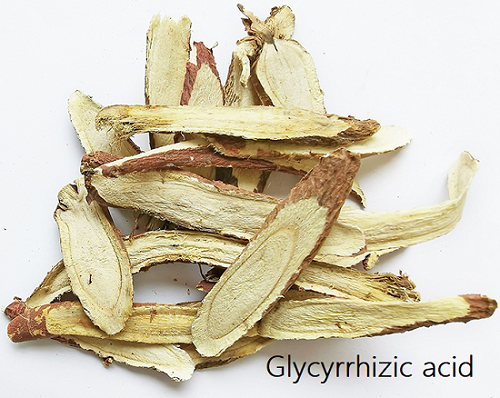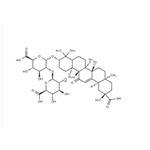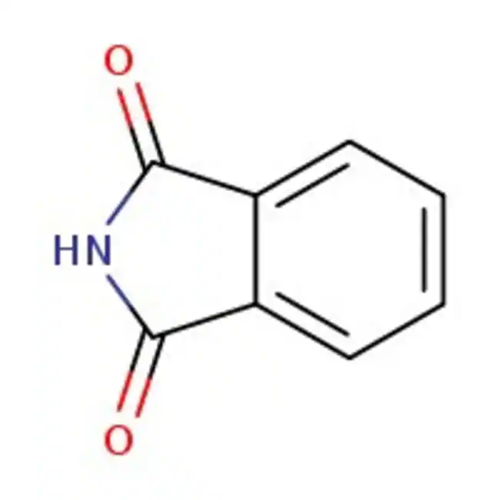Glycyrrhizic acid: Biological activity and Uses
Introduction
The known chemical components of Gancao include saponins (mainly glycyrrhizin (GA), 3.63–13.06%), flavonoids (1.5%), coumarin, alkaloids, polysaccharides, sitosterol, and amino acids. GA and glycyrrhetinic acid are well-characterized components of Gancao. Glycyrrhizic acid, a triterpenoid saponin glycoside found in the roots and rhizomes of licorice plant (Glycyrrhiza glabra) is one of the most widely known medicines since ancient times[1].

GA, also called glycyrrhizin, consists of one molecule of 18β-glycyrrhetinic acid and two molecules of glucuronic acid (18β-glycyrrhetinic acid-3-O-β-D-glucuronopyranosyl-(1 → 2)-beta-D-glucuronide). Glycyrrhizin is considered to be the major active component of Gancao, as demonstrated by studies of experimental animal models and clinical studies. GA has been used clinically for more than 20 years in patients with chronic hepatitis in China and Japan and shows a satisfactory therapeutic effect in many other diseases.
Biological activity
GA is the main substance of licorice, one of the most essential substances utilized in traditional medicine for almost 2000 years. Moreover, GA was reported to have antiallergic, antiviral, and anti-inflammatory activities. GA was also found to suppress the rise in fasting blood glucose and insulin levels and improve glucose tolerance. Additionally, although the mechanism is unclear, GA may act as an antidiabetic substance without inducing side effects.
Glycyrrhizic acid has a wide range of pharmacological and antiviral activities against enveloped viruses, including SARS-CoV. Glycyrrhizic acid has been reported to have antiphotoaging properties in ultraviolet-B irradiated human dermal fibroblasts by scavenging the ROS and blocking the MMP1 activation. Glycyrrhizic acid inhibits the UVB-induced production of pro-inflammatory cytokines tumour necrosis factor (TNF)-a, interleukin (IL)-1a, -1b and -6, and prostaglandin E2 (PGE2). Additionally, glycyrrhizic acid attenuates the UVB-induced apoptosis by inhibiting the translocation of Bax to mitochondria. Glycyrrhizic acid has also been found to prevent UVB-induced DNA damage (cyclobutane pyrimidine dimers formation and DNA fragmentation) via modulation of autophagic flux in Human dermal fibroblasts.
Uses
Glycyrrhizic acid is mainly used as a flavouring and sweetening agent for bitter drugs, beverages, candies, and chewing gum. It also may be present in some cough and cold mixtures[2]. Many health products and Chinese herbal teas contain considerable amounts of glycyrrhizic acid. Excessive intake of these products may result in Fanconi syndrome. GA has been developed as a hepatoprotective drug in China and Japan. GA can generate glycyrrhetinic acid through metabolic processes in the human body. Therefore, the pharmacological effects of GA are essentially the same as glycyrrhetinic acid.
[1] Jian-yuan Li. “Glycyrrhizic acid in the treatment of liver diseases: literature review.” BioMed Research International (2014): 872139.
[2] Zhang, Han et al. “Alternative Medicine and Chinese Herbs and the Kidney.” Critical Care Nephrology 2015 1 (2019): 1313-1319..
References:
[1] JIAN-YUAN LI. Glycyrrhizic acid in the treatment of liver diseases: literature review.[J]. ACS Applied Bio Materials, 2014. DOI:10.1155/2014/872139.[2] ZHANG H, RONG XIAO-DING, TAI K B, et al. Alternative Medicine and Chinese Herbs and the Kidney[J]. Critical Care Nephrology, 1900, 2015 1: 123-153. DOI:10.1016/B978-0-323-44942-7.00220-X.
You may like
Related articles And Qustion
See also
Lastest Price from Glycyrrhizic acid manufacturers

US $1.00-4.00/KG2025-09-08
- CAS:
- 1405-86-3
- Min. Order:
- 1KG
- Purity:
- 99%
- Supply Ability:
- 200000KG

US $0.00-0.00/kg2025-06-10
- CAS:
- 1405-86-3
- Min. Order:
- 0.001kg
- Purity:
- 99.99%
- Supply Ability:
- 2000000T


